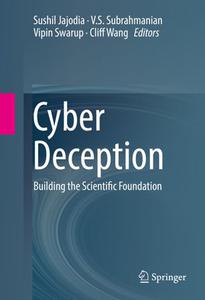Cyber Deception: Building the Scientific Foundation by Sushil Jajodia
English | PDF (True) | 2016 | 314 Pages | ISBN : 331932697X | 9.1 MB
This edited volume features a wide spectrum of the latest computer science research relating to cyber deception. Specifically, it features work from the areas of artificial intelligence, game theory, programming languages, graph theory, and more. The work presented in this book highlights the complex and multi-facted aspects of cyber deception, identifies the new scientific problems that will emerge in the domain as a result of the complexity, and presents novel approaches to these problems.




